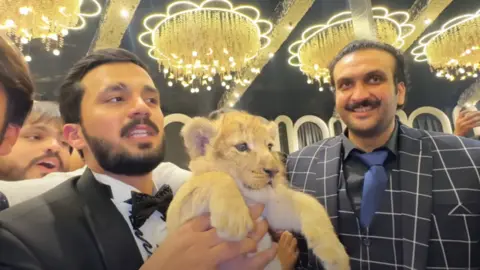ARTICLE AD BOX

 YouTube / Rajab's Family
YouTube / Rajab's Family
Rajab Butt (left) received the cub from Umar Dolla (right)
A Pakistani YouTube star has been ordered to create 12 animal welfare videos as punishment for illegally owning a lion cub.
Rajab Butt, who has 5.6 million subscribers, was pictured with the cub after he was given it at his wedding last month by the owner of another YouTube channel.
Under a community service order, Mr Butt has been ordered to produce a five-minute video per month for a year to educate his audience.
The cub has been moved to the Lahore Safari Zoo by authorities and named Bhatti.
In a statement, Mr Butt said he regretted accepting the cub and acknowledged that "keeping wild animals in such circumstances is inappropriate".
"As a social media influencer, I should create positive content. I was not authorised to keep the lion cub, and by doing so, I set a wrong example," he added.
A court also ordered the wildlife department to help Mr Butt produce his educational content.
A wildlife officer reported Mr Butt to the police after seeing a video he posted to his YouTube channel last month, where he received the cub at his wedding.

 YouTube/ Rajab's Family
YouTube/ Rajab's Family
Dolla tried to claim he was still the legal owner of the cub
It was given to him in a cage by Umar Dolla, who runs another YouTube channel called Lion Hub.
Mr Dolla claimed to the court that he was still the animal's legal owner. However, the judge ruled it had been seized by Butt, local media reported.
Mr Butt said he would "provide community service through my social media platforms and spread a positive message about the rights of wild animals".
Tariq Janjua, director of Lahore Safari Zoo, told local media that lions cannot be domesticated and keeping them was both cruel to the animal and a danger to humans.

 7 hours ago
1
7 hours ago
1








 English (US) ·
English (US) ·